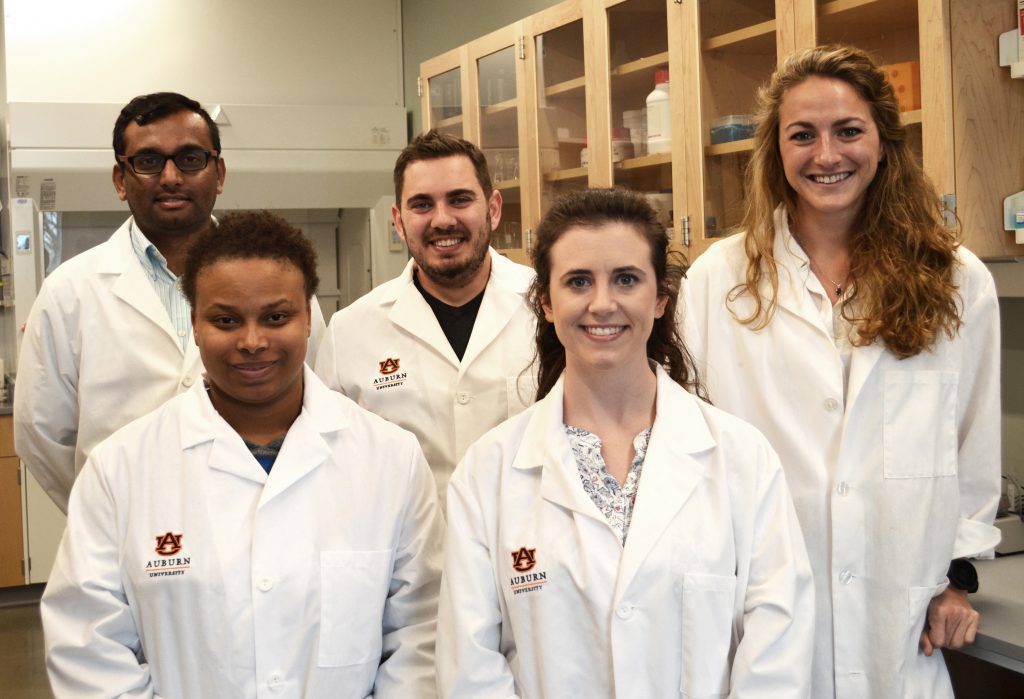February 11, 2019 – By Gail Riese, Harrison School of Pharmacy

The Auburn University Center for Neuroscience Initiative (CNSi) is pleased to announce its inaugural class of trainee scholarships. One of several CNS core initiatives, five trainee supplementation fellowships were presented to graduate students conducting ongoing neuroscience research. Each recipient received a $5,000 fellowship, with a second-year renewable $5,000 award.
Earning the newly-created fellowships were Manoj Govindarajulu, Logan Neel, Sweilem Al Rihani, Sharay Setti and Lauren Woodie.
In addition to advancing their independent projects, fellows will hone their research, networking and leadership skills through a program of activities including trainee work-in-progress (TWIP) meetings.
“The goal of the program is to develop outstanding young neuroscientists at Auburn through collaborative initiatives that span Auburn University and beyond,” said Vishnu Suppiramaniam, professor in the Harrison School of Pharmacy’s (HSOP) Department of Drug Discovery and Development (DDD) and co-director of CNSi.
Supported through a Tier 2 grant received from the Auburn University Presidential Awards in Interdisciplinary Research (AU PAIR), CNSi members collaborate to increase fundamental knowledge about the brain and nervous system and to use that knowledge to reduce the burden of neurological disease.
CNSi fellows were invited to apply and selected based on a merit scoring system as determined by an internal CNSi advisory committee. Plans to select the next cohort of fellows will be announced in the fall 2019.
“We hope this mechanism will be used to attract highly qualified students and enhance the research and scholarly profile of CNS members,” added Miranda Reed, associate professor in DDD and co-director of CNSi.
The inaugural class includes:
Manoj Govindarajulu is a doctoral student in DDD in Associate Professor Rajesh Amin’s laboratory. Amin’s lab investigates drug discovery for mitigating Alzheimer’s disease by enhancing anti-inflammatory signaling mechanisms and preventing neurodegeneration. Govindarajulu’s project focuses on determining the role of a novel PPAR-gamma agonist, developed in the Amin lab, that provides neuroprotection in the early stages of Alzheimer’s disease. This project is conducted in collaboration with Suppiramaniam’s electrophysiology laboratory.
“The position as a CNSi fellow will provide me with invaluable opportunities to expand my research, networking, and leadership skills for a highly competitive position in a research intense university environment.” – Govindarajulu
Logan Neel, a third-year doctoral student in DDD, works under the direction of Professor Forrest Smith. His laboratory focuses on computational design and organic synthesis of pharmaceutical compounds. Neel’s project focuses on developing a model of the cannabinoid-type 2 receptor which will be used to design potential pain-free drugs.
“Being a CNSi fellow will allow for opportunities to grow academically by being introduced to a variety of research topics within the neuroscience field. In addition, the (TWIP) meetings will enhance my leadership and networking skills.” – Neel
Sweilem Al Rihani, a DDD fourth-year doctoral student, conducts research in Professor Amal Kaddoumi’s laboratory. Her research emphasis is on understanding the contribution of vascular factors to neurological diseases, with a focus on Alzheimer’s disease (AD) and cerebral amyloid angiopathy, a condition in which proteins called amyloid build up on the walls of the arteries in the brain. Al Rihani’s project centers on developing and discovering drugs and natural compounds that are able to improve the structure of the brain’s major protective membrane, the blood-brain barrier, in an effort to minimize the risk and develop treatments that specifically target brain vessels function as possible candidates for treatment and/or to prevent AD progression.
“Becoming a CNSi fellow and participating in the TWIP meetings will provide me with invaluable opportunities to expand my research, networking leadership skills, and research collaborations with researchers in and outside of the AU network.” – Al Rihani
Sharay Setti is a fourth-year doctoral student in Reed’s laboratory. Her lab concentrates on the behavioral and neurobiological factors that regulate learning and memory, particularly during aging and Alzheimer’s disease. Setti’s project focuses on the role of synaptic pathology in the entorhinal cortex, one of the first and most heavily damaged brain regions affected in Alzheimer’s disease.
“As a CNSi fellow, I am looking forward to the chance to share my work and learn from my colleagues in the trainee work-in-progress meetings, advancing my leadership skills and scientific merit as part of a team.” – Setti
Lauren Woodie, a third-year doctoral student in the Department of Nutrition Science in the College of Human Sciences, is advised by Associate Professor Michael Greene. His lab focuses on the physio-metabolic consequences of consuming a Western diet with sugar water. Woodie’s project examines the impact of eating this diet on the rhythmicity of circadian core clock gene expression in the hippocampus and the implication of these disruptions on Alzheimer’s risk gene expression and hippocampal function.
“My position as a CNSi fellow allows me to not only make valuable connections with a wide range of experts in the field of neuroscience, but it also gives me the opportunity to apply my knowledge of nutrition science across the neuroscience community at Auburn and beyond.” – Woodie
The Auburn University Center for Neuroscience Initiative (CNSi) represents a collective body of faculty, trainees, and students engaged in neurosciences research and educational activities that span sub-disciplines across all Auburn University colleges and schools. Visit http://www.auburn.edu/cns (http://wp.auburn.edu/cns/).
Last modified:
